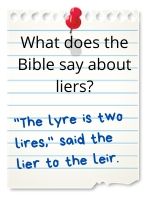
What does the Bible say about liers/lyres/lires/leirs?
Subtle differences in the spelling of words, whether Hebrew, Greek, or English, can alter the meaning of a phrase. To understand the Bible's stance on liers, we'll consider some alternative spellings, just to be safe.
Liers are people who lie down. Calling them "layers" would be confusing, since it makes people think of bean dip and cake. Scripture has much to say about liers, but those comments are situation-dependent. Wisdom literature imagines the wicked as those who lie in wait to ambush others. Those who lie down in order to take advantage of others are condemned in the Bible (Proverbs 1:11). Likewise, the Bible speaks against liers whose intent is Felonious Outsourcing of Recreational Nonverbal Illicit Communication Applied Through Integumentary Ogling and Nuzzling (Exodus 22:16).
Lyres are little harps often seen in classical art paintings being held by angels. Of course, real angels aren't naked white babies with tiny wings and strategically-placed clouds. Lyres, however, are actual instruments and the Bible often approves of them (Psalm 33:2).
Lires, when you're in Italy, are two or more now-defunct units of money. In Scotland, lires are body parts like cheeks or muscles.
Leirs—pronounced "LAY-ers"—are people who hang flower necklaces on tourists when they get off of airplanes. Scripture has little to say about this practice, other than when its connected to idolatry (Acts 14:13).
Liars are people who tell lies. The Bible has lots to say about that.
Liers are people who lie down. Calling them "layers" would be confusing, since it makes people think of bean dip and cake. Scripture has much to say about liers, but those comments are situation-dependent. Wisdom literature imagines the wicked as those who lie in wait to ambush others. Those who lie down in order to take advantage of others are condemned in the Bible (Proverbs 1:11). Likewise, the Bible speaks against liers whose intent is Felonious Outsourcing of Recreational Nonverbal Illicit Communication Applied Through Integumentary Ogling and Nuzzling (Exodus 22:16).
Lyres are little harps often seen in classical art paintings being held by angels. Of course, real angels aren't naked white babies with tiny wings and strategically-placed clouds. Lyres, however, are actual instruments and the Bible often approves of them (Psalm 33:2).
Lires, when you're in Italy, are two or more now-defunct units of money. In Scotland, lires are body parts like cheeks or muscles.
Leirs—pronounced "LAY-ers"—are people who hang flower necklaces on tourists when they get off of airplanes. Scripture has little to say about this practice, other than when its connected to idolatry (Acts 14:13).
Liars are people who tell lies. The Bible has lots to say about that.
This is what WOULD happen if GotQuestions.org genuinely, honestly answered all the mis-typed, autocorrected, or otherwise altered "spiritual" questions that come their way every day.
HOME | ABOUT | CATEGORIES | CONTACT | THE REAL SITE
© 2024 Got Questions Ministries. All rights reserved.

